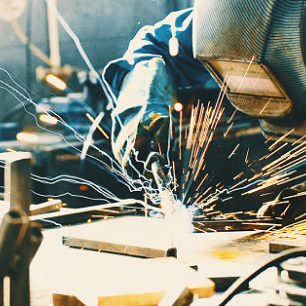Welding Digest
Jump to:
Welding on the Farm
Welding on the farm has a long tradition, and sometimes it’s all that keeps things moving. But farm welding brings its own challenges. Sometimes repairs need to be made where power isn’t availa-ble. Farming equipment and machines aren’t all made from the same metal. And let’s face it, farms come with dirt and, well, more than dirt. Neither mix well with welding.
Thankfully, a variety of machines on the market — including multiprocess and battery-powered units — can meet these challenges.
The Benefits of Better Technology
Unlike other day-to-day tasks, welding is done as needed. This means the individuals using the welding machines might not be experienced welders or they’re possibly out of practice, so having easy-to-use equipment is helpful.
Since the newest welding technology is similar to the mobile phone interfaces we’re all familiar with, it’s easier to become comfortable with the settings. Touch-screen controls, multimenus, and saved parameters for common jobs make learning welding a lot easier. And for experienced welders, these controls make the job faster.
However, better technology alone won’t provide solid welds. Proper preparation and an under-standing of the metals are necessary, too.
While some parts can be joined with shielded metal arc welding (SMAW) even through dirt, clean parts free from rust and debris will give you better welds every time. Take the time to learn which metals work best with each process and the wires or electrodes used. Clean welds start with clean materials and the right process.
Multipurpose, Multiprocesss Machines Matter
Rarely is a farm single purpose, so your welding machine shouldn’t be either.
Dairy farmers grow hay and other animal staples, crop farmers have herd animals, and then there’s all the farm-related hobbies individuals enjoy. All these interests bring repairable items made of multiple metals. Food-grade stainless steel is common among dairy farm equipment and requires a gas tungsten arc welding (GTAW) machine. Combines, tractors, and harvesters are often made of steel, so repairs here could be performed using SMAW or gas metal arc welding (GMAW). Fencing, chutes, and other items made of aluminum can require GMAW and specialized consumables.
With so many possibilities, a multiprocess welding machine could be a farm’s best friend. Even these powerful units can be lightweight and mostly portable, useful for the barn or on a truck bed with a generator.
Flexibility to Make Long-Distance Repairs
If something is going to break, rarely is it in a convenient spot to be fixed. This is even more true on the farm where the breakdown might be half a mile or more from the closest power source. This is where a battery-powered welding machine can be helpful.
Small but powerful battery-powered SMAW/GTAW machines will handle jobs along the fence line or fix parts well enough to get back to the barn. These machines recharge on standard 110-V power and last through several electrodes worth of welding. The GTAW options include parameter control on the GTA torch, along with pulse GTA for reduced heat input. They’re useful for on-the-spot re-pairs wherever you are.
Many other welding machines are also portable. New machines on the market weigh less than a sack of grain and provide production quality welding on 110- or 240-V power. What’s more, these machines can GMA weld aluminum and use advanced smart welding processes for difficult welds.
Protecting Your Investment
Packed soil and rocks are rough on tillage equipment. Faster field speeds mean faster wear and tear on those in-soil parts. An option to protect and extend the life of tillage equipment is hardfacing. This process places a layer of welded metal on top of wear parts to protect them from damage. When rocks or packed earth might cause chips or breaks, the added material provides a harder sur-face to withstand the barrage.
Hardfacing parts can either be hired out or done on the farm with a SMAW or GMAW machine. The two main methods of this process are overlay and buildup. Overlay is often used with new parts where specialized electrodes or GMAW wire are used to weld on layers of protection. Buildup is used to reshape worn-down parts and add protective edging.
Welding wire for GMAW hardfacing contains carbides, which require the wire to be thicker, usually 1/16 in. or larger. This type and size of wire will need a more powerful welding machine, so keep that in mind when researching options.
The Appeal of Stainless Steel
Stainless steel is becoming more common on the farm. It’s used not only for dairy farming with tanks and cups but also for animal feed and water, storage tanks, and even electrical and mechanical equipment. Though stainless has a long life, welds can be a weak spot if not properly handled and sealed.
The most common welding method for thin stainless steel is GTAW, though some GMAW machines are doing well in these applications. Stainless steel must have a chromium content of at least 10.5% to form the stable, passive chromium oxide layer that protects the metal. In addition, the heat of welding disrupts this layer and can leave the welded area less protected and more prone to corro-sion than the rest of the equipment. Manufacturers offer cleaning machines that help prevent these issues by electrochemically cleaning the weld and replacing the passivation layer.
As the Sun Sets
No matter what you grow or make, things break. And on a farm, those things are often made of met-al. Ensuring you have the option to fix whatever needs it is a sound investment. Knowing how to weld well and having the right equipment allow you to repair and repurpose, so you won’t have to replace. This keeps your costs and resource use low, leading to great goals for successful long-term farming.
This article was provided to the American Welding Society courtesy of Fronius USA (fronius.com), Portage, Ind.


